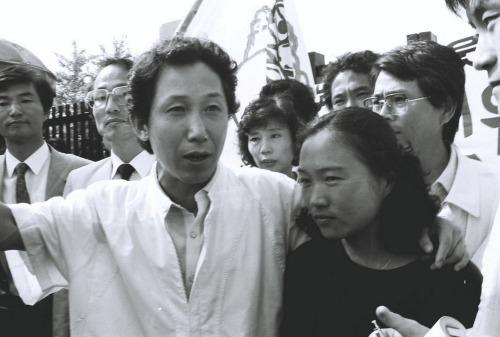A well-known victim of torture, dissident repression during dictatorships
Kim Geun-tae, a prominent liberal politician who died on Friday, has left a great political legacy for Korea by leading democracy movements and political reforms, as well as self reforms.
Kim did not only join a nationwide fight against the military dictatorship in his younger days but also sacrificed his presidential bid in the party nomination race twice for a greater cause.
Born in Bucheon, Gyeonggi Province, in 1947, Kim began studying economics at Seoul National University in 1968 and graduated with a bachelor’s degree in economics in 1972.
In 1972, he was wanted by the police for being involved in the student anti-government movement at his university. Since then, he was chased by authorities numerous times until then authoritarian President Park Chung-hee was assassinated on Oct. 26, 1979.
 |
Kim Geun-tae, the late standing adviser to the main opposition Democratic Unified Party, is greeted by his supporters and his wife after being freed from Kimcheon Prison in June 1988. He died on Friday at the age of 64. (Yonhap News) |
In 1983, Kim established the Youth Federation for Democracy, the first national organization to fight the military dictatorship, and served as president of the federation twice. Due to his role in the anti-government organization, Kim was imprisoned in 1985 and tortured with electricity and water for two weeks in a chamber at the anti-communist investigation office in Namyeong-dong, central Seoul. He had a difficult time with pain in early autumn of every year, side effects of the torture, news reports said. The torture reportedly sped up his Parkinson’s disease later.
He wrote a book “The Namyeongdong” in 1987 about his horrible experiences there. That same year, he received the Robert F. Kennedy Human Rights Award with his wife Im Chae-keun. In the following year, he was recognized as the World Conscientious Prisoner for Political Reasons by the Hamburg Freedom Foundation.
Again in 1989, he led a pro-democracy movement by heading the National Democratic Alliance of Korea and was imprisoned until 1992 for breaching of the National Security Law.
As the military dictatorship ended in 1993, Kim joined the political establishment by serving as a vice chair of the National Congress for New Politics.
He won a National Assembly seat in 1996, beginning his first term as a lawmaker. He won reelection in 2000 and 2004.
In 2002, he ran in the party nomination race for the presidential candidate of the New Millennium Democratic Party, but later announced that he would drop out, confessing that he had received illegal political funds.
As the then ruling Uri Party secured a majority in the general election in 2004, Kim was leading the party with then Rep. Chung Dong-young.
In 2004, Kim was appointed minister of health and welfare and gained experience in government administration.
In 2007, he gave up his bid for the presidential candidate from the United New Democratic Party to let Chung Dong-young secure the candidacy.
Kim ran in the 18th general election in 2008 but lost the race.
He had since served as a standing adviser to the current main opposition Democratic Unified Party, mediating the opposition camp’s efforts to form a united liberal front ahead of next year’s parliamentary elections.
Kim did not attend his daughter’s wedding ceremony on Dec. 8 because he was hospitalized.
By Kim Yoon-mi (
yoonmi@heraldcorp.com)








